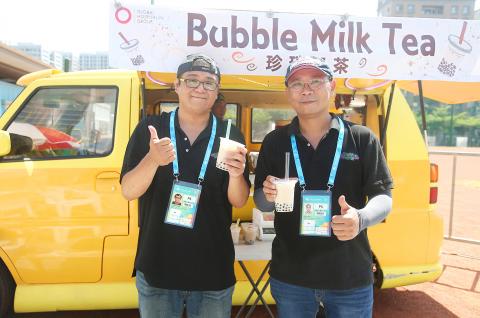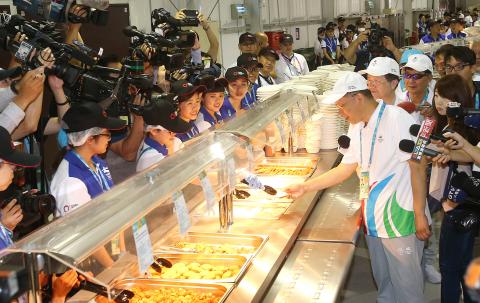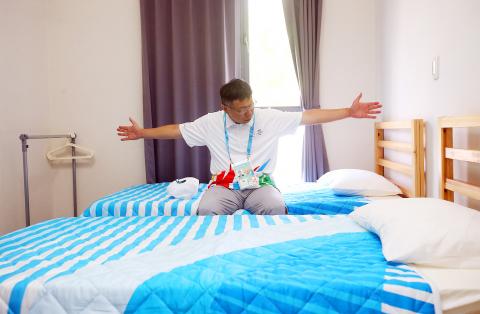The Summer Universiade Athletes’ Village in New Taipei City’s Linkou District (林口) was officially opened yesterday.
Taipei Mayor Ko Wen-je (柯文哲), International University Sports Federation president Oleg Matytsin, Taipei Universiade Organizing Committee chief executive officer Su Li-chiung (蘇麗瓊) and Athletes’ Village director Chiang Han-sun (江漢聲) attended the opening ceremony yesterday afternoon.
“Taipei is now ready to welcome the world with the best of our hospitality,” Ko said in his speech.

Photo: CNA
The village includes 34 buildings, each 12 stories to 21 stories high. Athletes’ accommodation ranging from one to four-bedroom units occupies 23 of the buildings, each of which has a rest area, a service counter and a medical room.
The village has a cafeteria that can seat up to 3,500 people, is to run 20 hours per day and should serve an estimated 35,000 to 40,000 meals daily featuring different cuisines from around the world.
Commercial services, such as dry cleaners, beauty salons, flower shops, banks, a post office and an official souvenir shop are also included.

Photo: CNA
A central security command center has been set up in the village and more than 500 officers have been stationed there, Taipei Special Police Corps deputy chief Lin Chun-yi (林浚奕) said, adding that they are to conduct patrols around the clock to keep the athletes safe.
A 3m-high fence around the perimeter of the village is to channel all people entering and leaving the area through restricted checkpoints at designated entrances, Lin said.
To enter the village, athletes must wear their identification badges, which are to be checked by card readers, he said, adding that their belongings are to also be checked by an X-ray machine.

Photo: CNA
Athletes must also pass through a metal detector door and may be scanned with a handheld metal detector if necessary, Lin said.
Any cars entering the village are to be checked with metal detectors and under-vehicle explosive scanners, he added.
During Ko’s visit, he lay down on a bed in a three-bedroom unit to test its comfort level, drank a cup of bubble milk tea and ate a few Taiwanese snacks from the cafeteria.
The bedroom unit was nice, especially the air-conditioning, Ko said, adding that he thinks the scale and quality of the village, especially the cafeteria, were better than the village in South Korea’s Gwangju he had visited.
Responding to questions about not being able to play the national anthem or raise the national flag during the opening ceremony, he said: “The city government has done the best it could, but the [Chinese Taipei Universiade] flag and the [national flag] anthem were registered with the application to hold the games.”
The city government must conform to the Agreement Between the International Olympic Committee, Lausanne and the Chinese Taipei Olympic Committee, Taipei, Ko said.
Responding to questions about why he said “Taiwan” rather than “Chinese Taipei” in his opening speech yesterday, Ko said: “We are Taiwan. Otherwise, who are we?”
The Summer Universiade is to be held from Saturday to Aug. 30. More than 7,639 athletes are expected to compete.
Additional reporting by CNA

Alain Robert, known as the "French Spider-Man," praised Alex Honnold as exceptionally well-prepared after the US climber completed a free solo ascent of Taipei 101 yesterday. Robert said Honnold's ascent of the 508m-tall skyscraper in just more than one-and-a-half hours without using safety ropes or equipment was a remarkable achievement. "This is my life," he said in an interview conducted in French, adding that he liked the feeling of being "on the edge of danger." The 63-year-old Frenchman climbed Taipei 101 using ropes in December 2004, taking about four hours to reach the top. On a one-to-10 scale of difficulty, Robert said Taipei 101

A preclearance service to facilitate entry for people traveling to select airports in Japan would be available from Thursday next week to Feb. 25 at Taiwan Taoyuan International Airport, Taoyuan International Airport Corp (TIAC) said on Tuesday. The service was first made available to Taiwanese travelers throughout the winter vacation of 2024 and during the Lunar New Year holiday. In addition to flights to the Japanese cities of Hakodate, Asahikawa, Akita, Sendai, Niigata, Okayama, Takamatsu, Kumamoto and Kagoshima, the service would be available to travelers to Kobe and Oita. The service can be accessed by passengers of 15 flight routes operated by

Taiwanese and US defense groups are collaborating to introduce deployable, semi-autonomous manufacturing systems for drones and components in a boost to the nation’s supply chain resilience. Taiwan’s G-Tech Optroelectronics Corp subsidiary GTOC and the US’ Aerkomm Inc on Friday announced an agreement with fellow US-based Firestorm Lab to adopt the latter’s xCell, a technology featuring 3D printers fitted in 6.1m container units. The systems enable aerial platforms and parts to be produced in high volumes from dispersed nodes capable of rapid redeployment, to minimize the risk of enemy strikes and to meet field requirements, they said. Firestorm chief technology officer Ian Muceus said

MORE FALL: An investigation into one of Xi’s key cronies, part of a broader ‘anti-corruption’ drive, indicates that he might have a deep distrust in the military, an expert said China’s latest military purge underscores systemic risks in its shift from collective leadership to sole rule under Chinese President Xi Jinping (習近平), and could disrupt its chain of command and military capabilities, a national security official said yesterday. If decisionmaking within the Chinese Communist Party has become “irrational” under one-man rule, the Taiwan Strait and the regional situation must be approached with extreme caution, given unforeseen risks, they added. The anonymous official made the remarks as China’s Central Military Commission Vice Chairman Zhang Youxia (張又俠) and Joint Staff Department Chief of Staff Liu Zhenli (劉振立) were reportedly being investigated for suspected “serious